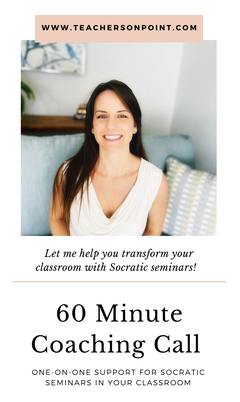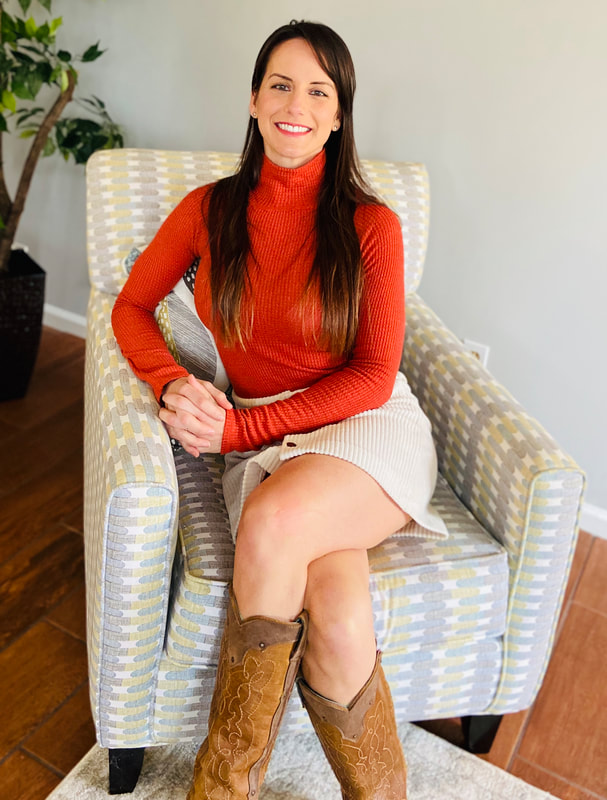|
If you've been with me for a while, you know that my first year of teaching was absolutely gut wrenching, but I learned a lot.
It was at the beginning of the year that I asked for my Vice Principal to come into my classroom and teach one of my lessons to my students. I needed help with how I could engage with my students, the ones who did not listen to a word I spoke. I noticed that her demeanor was that of utter confidence and when she directed students to do something, such as stop talking, put the pencil down, and don't lean back in the chair, she said two magical words after her directions. Those words were "thank you". And believe it or not, this actually worked! The kids stopped whatever it was and did what she asked. It's like she didn't even give them a chance to NOT do it because she was telling them thank you FOR doing it. And, like I said, she was standing tall with complete confidence as she spoke. I experimented with these two magical words and I had the same reaction. The kids listened. I used this technique since that day forward. I even use it at home with my kids! It's not the end all, be all to better classroom management, but it certainly does help. If you are struggling to get your students to listen, try giving the direction with confidence, immediately followed by "thank you". I sometimes follow that with silence and a teacher look, if the student does not cooperate right away. "Arnold, please turn around and look at the board. Thank you." Look at Arnold until he turns around. Of course, this is not full-proof, so what did I do when the student still did not listen? I put their name on the board as a reminder to follow up. This was not an official part of my classroom management plan that I went over with my students. And not everything you do with your students has to be. You are in charge. You make the rules. So whatever you want to do, you can do. Students have a say, especially if you use Responsive Classroom techniques, but in the end, it's your classroom that you are responsible for. I would often put reminders on the board throughout the day, such as, email parents about field trip forms, get passes, collect notebooks. These things would come up and I would quickly write them on the side of the board so I wouldn't forget. Just as nonchalantly as I would write collect notebooks, if a student decided to ignore my directions, I would write his name. Sometimes this would get the student to do what I asked (and I would still follow up). And sometimes when I would follow up, it involved discussing the behavior and implementing a consequence. It's the time of year right now where we need to make sure we are not letting things get crazy. Or at least not appear to be crazy. Keeping students accountable even when it feels like we want to throw in the towel is what will make or break this time of year. Keep going! You are doing great! I promise.
0 Comments
There used to be many different reasons to use the Socratic method in classrooms, but after the response to the pandemic and holding kids in their homes and OUT of the classroom for years, it's become even more crucial of a method of teaching. Below I talk about what Socratic seminars are, why they are beneficial to students of upper elementary all the way through high school and how you can begin to use this method in your classroom. What are Socratic seminars?Socratic seminars are a method of teaching that essentially put the "teaching" into the hands of students through classroom discussions. It's facilitated by the teacher, but directed by the students. They come to class prepared by having done a teacher selected reading or video, perhaps even listening to a podcast or solving a math problem. Students also will have completed some of, what I like to call, "thinking work" which could be in the form of notes, questions written out or even summaries of their understanding. The class comes together in a circle with their prepared work and they have a discussion. This can be done with any subject. In math for example, students will discuss the different strategies they used to solve a problem. The class will critically think about the different ways people solved for an answer and decide two things: which method makes the most sense to them and two: do the methods being discussed solve the problem correctly. In Language Arts, Science and Social Studies, the students are thinking critically about the information they learned. In reading for example, they are asking each other to explain the thinking because most of the time, students have thought differently about the text. They articulate their use of comprehension strategies in a natural way as they are being asked questions or simply asked to explain their thinking. So how is this beneficial to students?Socratic seminars benefit students in a number of ways. For one, it's been obvious to anyone who works with kids recently that they are sometimes literally unable to articulate their thoughts. We can look at research or just use our common sense to conclude that before we had the pandemic, where kids were housebound and cut off from their peers and school, we had technology playing a part in their everyday lives in a way that didn't require them to communicate verbally with each other. And these things were taking over. Apps such as Discord, video games, text messaging and social media have created a paralyzation in verbal communication. Add to the fact that many kids were told they could not see or play with their friends and they would also be kept from the classroom, well, it was a recipe for disaster. And we, as teachers, are in a position where we can help our students gain back these very important necessary skills. Where can you start? How to Implement Socratic seminars into your classroomIf you haven't already, download the free conversation poster and discussion packet from my website. These two teaching tools will help guide you in having your first whole class discussion (Socratic seminar) with your students.
Day One 1. Get your students to buy into this method. Chances are, it won't take much because kids love to talk and to feel like they are in charge. Two things they get to do with this method of teaching. 2. Display the conversation poster and explain that they will be holding a conversation without much direction from you AFTER they show you that they can follow these steps. The poster explains what to do if you are a speaker and what to do if you are listening. Go through each one very explicitly, no matter what grade you teach. Day Two 1. Set your class up to be sitting in a circle and read a short picture book. I loved reading the Junkyard Wonders by Patricia Polacco as it creates strong feelings within the readers. However, you can choose any book that you think will illicit opinions and strong feelings. 2. Remind students of the poster you shared with them yesterday. (This should stay hanging up in your classroom.) 3. Refer to the questions packet and tell your students that, to start, you will be asking the questions and for them to answer WITHOUT raising a hand. (You will want to have a quick overview of what to do if two or more people want to talk at once)Their job is to then respond to the answer to the question. 4. As you begin to ask the questions and students are answering and responding to each other, stop at any point where they are not following the poster norms. For example, without a doubt, students will look only at you when responding. Stop the student immediately (this reinforces the importance) and remind him that he should be looking at EVERYONE, not just the teacher because he wants his peers' response, not yours. This will then get the kids to start to realize that you aren't joking. This is not a time in the day where you are the one they should be focusing on. No, it's time now for them to focus on each other and learn from each other. As you practice this method, keep coming back to the poster norms and allowing students to make mistakes, but encouraging them along the way. If you would like more support with this, sign up for my live one-on-one coaching session. Here we will discuss your students specifically and the needs of your classroom. We can troubleshoot or I can even help you to get started. Click here. I recently read this book and it is one of those books that after you read it, you want to share it with the world.
The book is called, Positive, a memoir by Paige Rawl. It's not the kind of book I would recommend for just any class. It's a mature subject and you definitely want to read it all the way through before deciding on whether you want to use in your classroom or not. I would say 7th graders, possibly 6th graders would enjoy it. Paige is a girl who was born with HIV essentailly beause her father cheated on her mother. The cause of her disease is not something she goes into in detail in the book and it's not what the book is centered around. What it is centered around is how she overcame being an outcast because of her HIV. To her, she always thought of it as something similar to a disease such as diabetes. Until one day when she as comforting her best friend and opened up about it. That "friend" told everyone and then began the social challenges in Paige's life. How she overcame all of what she went through is a true testament to her character. This young lady did more in her life by the time she was 18 than I have done in my entire 40 years. This story is an inspiration. Something I am sure none of us think about when we are told to celebrate diversity is those who are suffering with an illness and how that can be isolating. I am guilty of this before I read her book. During my first year of teaching, I had a student who had AIDS. His name was Charles and he lived with his grandparents who were taking care of him. The other students didn't know about his situation and I am not sure how much of it he understood. He was only in 4th grade and hardly in school because he got ill often. He never was able to make many friends because of it. I thought about Charles when I read Paige's memoir. I also thought about another student I didn't teach, but who was in the same school, suffering from cancer. Everyone knew she had cancer simply because it was not something she could hide. There are so many children in our world with burdens like this to bear. There might be one in your classroom now. If this book seems like it would be appropriate for you to share with your students, I urge you to do so. I truly feel it offers so much in the way of connections and conversations. And if it's not appropriate for your class, perhaps you'd like to read it for your own enjoyment. If you do, I would love to hear about it. A common theme among new teachers is wanting to develop their teacher craft. This is something that makes you the unique teacher that you are and so I can understand why it feels important. It is! Without a doubt, it definitely takes time, but it also needs to be something you are intentional about. With all of the latest programs being thrown our way, scripted lessons and obligations set by administration, it can be easy to find yourself just trying to stay on top of everything. If you’re also dealing with classroom management issues then you might just be trying to survive each day. Regardless of your situation, you are able to develop your craft if you are willing to dedicate some time to it. My first year of teaching I dealt with scripted lessons and a classroom full of kids who I thought hated me. I know that if I was able to find pockets of time (and energy) to dedicate to my teaching craft, then anyone can. And… because you are here reading this article, I know that you are at least interested in trying to do this for yourself and your students as well. By implementing some of the strategies I’ve come up with, you can start to feel more confident in your teaching and enjoy your job. I promise!
It's no surprise that teachers encounter all kinds of personalities in their classrooms and have to navigate different methods of dealing with all of them. When new teachers ask me what is the best advice when dealing with student misbehavior, I say, it depends. There are so many different things I have tried over the years that to say "this works" and "this doesn't" is nearly impossible. Instead, I thought of a few different methods I've used multiple times over the course of the years.
I explain the behavior I was experiencing with several students and tactics I used that worked in those situations. The other day I was talking to a friend who I have known since the very first day I became a teacher. We were discussing how much has changed, not only in the classroom, but with schools and students in general over the past 15+ years. But as the conversation progressed, we realized that there is SO MUCH that has not changed and probably never will.
Oh what the first year of teaching would have been like had I known what I know now….one can dream of being that confident and successful their first year. Or one can read this article and be given some really great advice from a veteran teacher ;) Over the years, I have had many teacher friends who left the profession. The most recent two who left this past school year seem to be happy, but both miss something from their teaching days. One misses the critical thinking aspect and the other misses the creativity. The grass is always greener, but I can’t help and think that maybe if these teachers had better support they would’ve stuck it out until they got over the, what I like to call, “the new teacher hump.” There are tons of benefits to being a teacher that have nothing to do with actually teaching….can someone say summers off?! Then there are the benefits that do relate directly to teaching and that is the difference you get to make in children’s lives every single day, the creativity and the problem solving. The sad reality is that even with all of the benefits, teachers are leaving the profession in droves. They say if you can make it past your 5th year of teaching then you will most likely stay for the long haul. When I sit back and think about my first few years of teaching, there are a lot of things that I wish I had known. Things that would have helped me to sleep better at night and things that would have made the day to day more bearable. Below is that list curated just for you! I will never forget when I was in my first year of teaching, I would get kicked out of the building at 6:30pm because that is when the custodial staff left and I wasn't allowed to be alone. I would race home to then finish my work by around 10-11pm. Somewhere in between that, I ate dinner, then I'd shower before going to bed only to be up a few hours later to do it all over again. I NEVER felt like I was caught up on anything.
During my second year of teaching things improved for me because I was allowed to stay as late as I wanted! So that meant, getting home between 7-8pm, shoving dinner down my throat and then getting a shower before bed and doing that all over again. See how I gained 2 hours there? It took me 10 YEARS to realize that life was not good like that and then about another 2 more years to figure out how to change it. Below is an abbreviated list of things I wish I knew my first few years of teaching to save me some time and energy and allow me to have a life outside of school. One thing I am asked about often is how to grade the work students complete in Socratic seminars. I like to think of it more as tracking and assessing rather than grading. It’s more important to track progress than it is to give students a grade because Socratic seminars are designed to meet students where they are in terms of the many different skills needed to have a successful seminar. In order to monitor progress, I track student participation. For a more traditional sense of grading, I use a rubric to score their writing responses (to the seminar). Using both of those methods, I am able to really assess a student’s understanding of our class novel and identify areas in which they need more support.
One of the biggest struggles I’ve had in the past and (it still comes up now and then) with students is getting them to respond authentically to each other. I know that when we first start teaching kids how to have a group conversation, we tell them that it’s important to always recognize the person who just spoke. I practice this all the time with my students, until they get it right. In the past, I have given them sentence starters such as, “I agree,” or “I disagree”, etc.
I noticed that yes, it does help to provide those, but then I started to have kids saying things like, “I agree” and start talking about something completely different or even agreeing to an opinion that, after they start talking, I realize they didn’t actually agree at all! I remember feeling like I failed in a way because the kids were just spitting out the responses I told them to say. They didn’t really know how to respond to each other authentically and the conversation wasn’t a conversation at all.
One of the biggest struggles I've dealt with during Socratic seminars was getting students to discuss the book at the beginning, before anything interesting or important has happened yet. It always felt like there wasn’t much to say until about a third of the way through the story after already meeting for a few weeks. The conversations were dull until the main character started to be developed more or the problem/plot started to build.
Below is a list of strategies to get the Socratic seminar going before the book becomes really engaging: |
Julia GrahamDaughter of the King, wife and mother, former upper elementary teacher, curriculum and course developer Archives
March 2023
Categories
All
|
Pages |
Resources |
|












 RSS Feed
RSS Feed